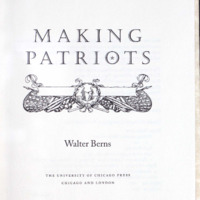-
Title
-
Making patriots
-
Description
-
The author explores the role of patriotism in American life, tracing the history of patriotic acts and sentiment from the ancient Greeks to the present and probing the role of citizen in an increasingly jaded American society. Samuel Johnson once remarked that patriotism is the last refuge of scoundrels, but is he right? Recent events such as the bombing of federal buildings and the formation of threatening militias in the name of patriotism suggest that he may have been on to something. But the United States has also seen its share of heroes, patriots who, over the course of history, have willingly put their lives at risk for this country and, especially, its principles. And this is even more remarkable given that the United States is a country founded on the principles of equality and democracy that encourage individuality and autonomy far more readily than public spiritedness and self sacrifice. Walter Berns's Making Patriots is a pithy and provocative essay on precisely this paradox. How is patriotism inculcated in a system that, some argue, is founded on self interest? Expertly and intelligibly guiding the reader through the history and philosophy of patriotism in a republic, from the ancient Greeks through contemporary life, Berns considers the unique nature of patriotism in the United States and its precarious state as we enter the twenty first century. And he argues that while both public education and the influence of religion once helped to foster a public minded citizenry, the very idea of patriotism is currently under attack. Berns finds the best answers to his questions in the thought and words of Abraham Lincoln, who understood perhaps better than anyone what the principles of democracy meant and what price adhering to them may exact. The graves at Arlington and Gettysburg and Omaha Beach in Normandy bear witness to the fact that self interested individuals can become patriots, and Making Patriots is a compelling exploration of how this was done and how it might be again.
-
Identifier
-
950258
-
226044378
-
Creator
-
Berns, Walter
-
Source
-
Brian Lamb Booknotes Collection
-
Gift of Brian Lamb, 2011.
-
Catalog record
-
Language
-
eng
-
Date
-
2001
-
Program air date: August 19, 2001
-
Publisher
-
University of Chicago Press
-
George Mason University. Libraries. Special Collections & Archives
-
Text
-
Transcription of Annotations
Notes on front endpapers: Tues, Jun.26, 2 p.m. - "Tocqueville. - The Marine flag story, p. 145. - What did you think of Clinton's conversation on race? - 1982: delegate to UN Human Rights Commission. - Religion - Locke - Jefferson's statute for Religious Freedom. - Is America a secular state? - Lincoln - patriots of '76. - Unamerican - no term like it in any other nation". - Notes on back endpapers: "There has never been a war between America and another liberal democracy. - p. 53: Thomas Jefferson Chandler; Stephen Decatur; Nathan Hale; U.S. Grant; Robert E. Lee - indicted; Cato; William H. McGuffey; Horace Mann; Euclid; Plato; Montesquieu. - Bible and Lincoln, p. 89. - Bottom line: present day politician. - Lord Charnwood - best of Lincoln's biographers. - King George III; John Locke; Tocqueville; John Witherspoon; Thomas Jefferson; Alexander Hamilton; Rousseau; Socrates; Fredrick Douglas; Dred Scott; Edmund Burke; Samuel Johnson; Martin Luther; George Washington; Abraham Lincoln; Horace Greeley; Henry Clay; Alexander Stephen; Jefferson Davis; Patrick Henry; John Jay; Karl Marx; Adam Smith; Thomas Paine." -- Annotations by Brian Lamb in the margins and underlining of pertinent phrases throughout the book. - Examples: p. 14: "Sparta, a city that discouraged self-interest and self-gratification, could not possibly provide a model for America." - p. 16: "The connection between war and patriotism, or better between war and the making of patriots, is evident; perhaps even self-evident." - p. 18: "We were the first nation to declare its independence by appealing not to the past but to the newly discovered "Laws of Nature and of Nature's God." - p. 30: "Locke, in turn, proposed to restore unity by taking religion out of politics." - p. 39: "The Founders did not appeal to conscience, nor were they objecting to a particular law. Their complaint was with a "prince [who was] unfit to be ruler of a free people," and they claimed the right to "alter and abolish" the government he had imposed on them." - p. 78: "But the schools today are a far cry from what Jefferson expected and would have required them to be." - p. 123: "Historians disagree as to whether, had the congressional Republicans persisted, Radical Reconstruction (as it came to be called) might have succeeded, and southerners might have learned not only to live without slavery but to recognize the former slaves as their fellow citizens."
-
Subject
-
"Patriotism--United States--History."
-
"Citizenship--United States--History."
-
"Political rights--United States--History."
-
"Freedom of religion--United States--History."
-
"Political science--United States--History."
-
Relation
-
Original Booknotes interview
-
Rights
-
This work may be protected by copyright laws and is provided for educational and research purposes only. Any infringing use may be subject to disciplinary action and/or civil or criminal liability as provided by law. If you believe that you are the rights-holder and object to Mason’s use of this image, please contact speccoll@gmu.edu.
 950258.pdf
950258.pdf